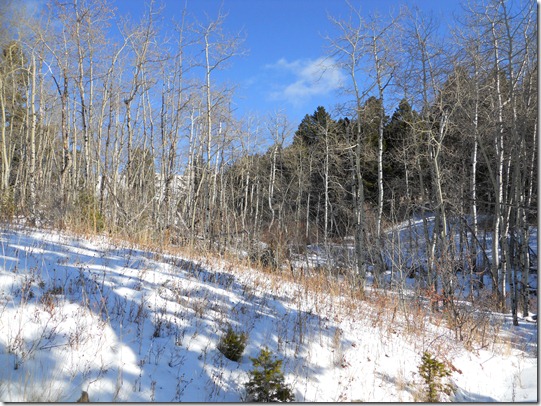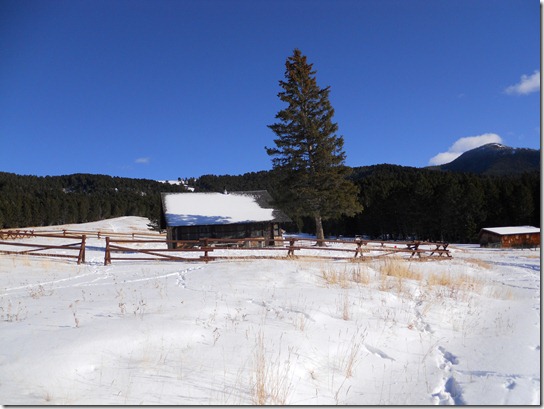I’ve been in limbo for a several days now (oh, wow, it’s been nearly two weeks since I last wrote. That’s terrible.). I’m working on an essay about the tense and bitter relationship between my paternal grandmother and my mother. Part of the emphasis of the essay is grandma’s mysterious background. Both her father and her maternal grandfather came to America under some sort of secretive circumstances and we haven’t been able to find out anything about them or even any records about them, or grandma’s mother, entering the U. S.
The mystery has me in a dither (has had me in a dither for several decades, actually), so I’ve been on the internet lately trying to find out anything I can about them. I also read a book on Russian history. I’ve been doing this research to find any true facts I can about grandma’s family for the essay. I did find out a couple of things we didn’t know before, but nothing, really, to go on with it. I have two photographs of grandma’s, which were in the vanity I inherited: one is of her father (a not particularly handsome soldier who, according to grandma’s stories, rode a tall white horse in the Russian army to escort prisoners to prison camps) in Russian military uniform with his parents, supposedly in Lithuania. Of note in this picture, is the austerity of the background and the furniture, which were surely what was available in the photographer’s studio, as well as the clothes his parents are wearing: they are of common materials. They were probably peasants. (And her father’s father, whose name we believe was Wincenty, is where grandma’s nose came from.) The other picture is of her mother, a very pretty girl about eleven or twelve years old (I’d guess) standing beside two seated young men in Russian military uniforms. Grandma didn’t know who the men were, but I presume they are her mother’s older brothers, although we know nothing about any siblings nor even anything about grandma’s grandmother. The background and furniture in this picture are rather fancy, as is the dress grandma’s mother is wearing. They were probably not peasants. I read on the internet that photos were usually taken of Russian military men when they were about to be shipped off to a distant part of Russia or to a foreign country, usually with their parents, but sometimes with other siblings.
Grandma said that her grandfather came to America with a passport he forged. She said he worked in the passport office in Grodno, which was in Russia at the time, though grandma said they were Polish. She also said that he forged the passport because he had an affair with a married woman and her husband challenged him to a duel, so he escaped to America. Some of that doesn’t make any sense to me, because he must have changed his name at least a couple of times in getting here. Unless he came into America through some sort of underground network which skirted him into a life in America without all the paperwork of entering. And if he had a passport, why would he have done that?
According to grandma, her father’s name was Stephan Gigielewicz (though I found, in the marriage records of Philadelphia, 1901, his given name spelled Stefan), and he defected to America because he hated his position in the Russian army. I can certainly understand that and I don’t have any qualms with his story. And grandma had spelled her grandfather’s name as Wtadystaw Sawicka. I could find absolutely nothing anywhere for that spelling of his first name, but I did find that Russians and Poles, at least at that time when writing in Roman letters, crossed the letter L with a short upward stroke (which was quite different than the crossing on a T), both lower and upper case and the name Wladyslaw (with the W pronounced as a V, of course) was a common name. Wladyslaw, according to family records, died sometime around 1915 in Philadelphia, but I haven’t been able to find that out for sure, not even under the name Stanley Sawicka, which grandma said he went by in America.
It’s possible grandma’s mother’s family was of Polish descent, but there was no Poland at the time her family would have come to America, it had been dissolved. Grodno was never part of Poland until after WWI, but was in Lithuania until both Lithuania and parts of Poland were absorbed into the Russian Empire. Poland was later divided up (ripped apart) and distributed between arguing, neighboring countries long before grandma’s grandfather would have been born. Although I read nothing about any such strict rules placed on Lithuanians, the Tsar forbid Poles to speak Polish and schools in the area that had been Poland taught exclusively in Russian. Still, it is possible they were of Polish descent and maybe they even spoke Polish, secretly, in their home in Russia. Grandma said that “when the women got together, they spoke Polish.” However, her father and mother moved to Idaho, apparently away from her grandparents, in 1904, when grandma was two, and being so far apart they probably didn’t get together all that often. And though she knew a little about her grandfather, grandma did not even know her grandmother’s name and she never learned to speak Polish, Lithuanian or Russian.
I did not grow up believing I had any Russian ancestry. Grandma was adamant, as were her parents, that they were Polish and Lithuanian. All that historical information I read at least explained why my Lithuanian great grandfather, at least until he and my great grandmother learned to speak English, was able to communicate with my supposedly Polish great grandmother: they would both have spoken Russian.
So I still have so little to explain, in my essay, about the mystery of grandma’s background, which was one point of contention with my grandfather’s family when he wanted to marry grandma and which was at least part of the cause of grandma being so bitter and unaccepting.

